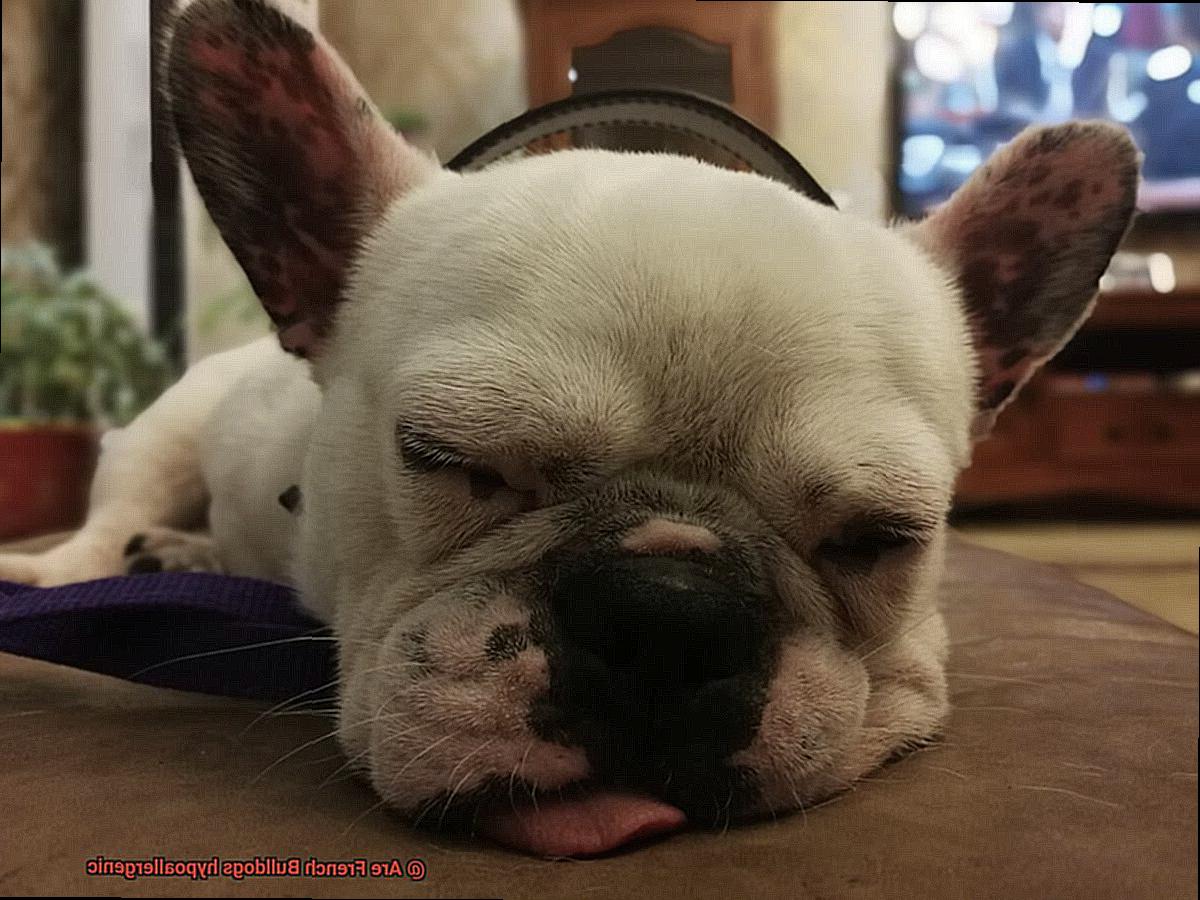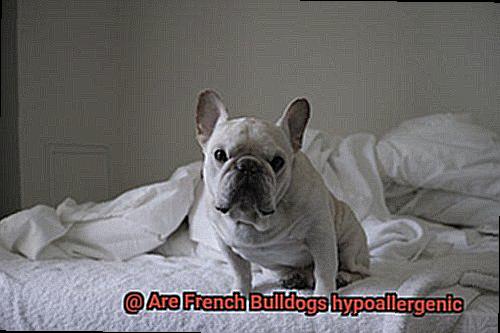Are French Bulldogs hypoallergenic?
Step into the world of French Bulldogs, where these charming, pint-sized pups are sure to steal your heart. With their playful personalities and unique colors and patterns, it’s no wonder they’ve become a popular choice for dog lovers everywhere. But for those who suffer from allergies, there’s one burning question on their minds – are French Bulldogs hypoallergenic?
The short answer is no, but don’t let that deter you. While Frenchies aren’t considered hypoallergenic, they do have qualities that make them a great option for allergy sufferers. Their low-shedding coat and short hair mean they produce less dander than other breeds, making them a more tolerable companion for those with allergies. Plus, their small size makes them perfect for apartment living or homes with limited space.
But why the obsession with hypoallergenic breeds? It all comes down to allergens produced by dogs in their saliva, urine, and dander. These allergens can trigger reactions like coughing, sneezing, and itching in many people. Hypoallergenic breeds are sought after because they produce fewer allergens overall.
If you’re considering adopting a French Bulldog despite your allergies, this article is here to help. We’ll dive into the details of whether or not Frenchies are hypoallergenic and provide tips on how to manage your allergies while still enjoying the company of these lovable pups. So let’s get started.
What is Hypoallergenic?
Contents
It’s a word commonly used to describe products or animals that are less likely to trigger an allergic reaction in humans. The prefix “hypo” means “less than” or “below,” while “allergenic” pertains to substances that can cause an allergic reaction.
When it comes to French Bulldogs, some breeders and sellers advertise them as hypoallergenic, making them seem like the perfect pet for people with allergies. However, it’s important to note that no dog breed can be completely hypoallergenic. All dogs produce allergens in their skin cells, saliva, and urine, and the level of allergens varies from dog to dog.
Some breeds may produce fewer allergens than others or have coat types that shed less hair and dander, making them potentially more tolerable for people with allergies. While French Bulldogs do have a shorter coat and shed less than some other breeds, they still produce enough allergens to cause allergic reactions in some people.
In addition to shedding, Frenchies’ wrinkles can also trap dust and other allergens, making them even more problematic for allergy sufferers. Dander is another factor that makes French Bulldogs non-hypoallergenic. All dogs produce dander, which is made up of tiny flakes of skin that can become airborne and cause allergic reactions in some people.
While there is no way to completely prevent a dog from producing allergens, there are steps that can be taken to reduce the amount of allergens a Frenchie produces. Regular grooming and bathing can help remove loose fur and reduce the amount of dander on a dog’s skin. Keeping the home clean and using air purifiers can also help reduce the number of allergens in the air.

It’s important to remember that allergies can be caused by factors other than dog hair or dander, such as pollen, dust mites, and mold. Therefore, it’s always wise for potential dog owners with allergies to consult with their doctor before getting a pet and take necessary precautions such as regular cleaning and grooming of the dog.
Are French Bulldogs Hypoallergenic?
French Bulldogs are a beloved breed, famous for their adorable looks and amiable personalities. However, if you’re one of the many allergy sufferers out there, you may be wondering whether Frenchies are hypoallergenic. The answer is no, unfortunately. But fear not – in this article, we’ll dive deeper into why French Bulldogs are not considered hypoallergenic and what you can do to minimize allergens in your home.
One of the primary reasons why French Bulldogs are not hypoallergenic is because they shed frequently. Despite their short fur, Frenchies’ shedding can still be a significant problem for people with allergies. Additionally, French Bulldogs produce a considerable amount of dander, which is a common allergen for many people. And if you’re allergic to pet saliva or dander, the French Bulldog’s notorious drooling might not be the best fit for you.
Furthermore, French Bulldogs can also be prone to skin allergies themselves. These furry friends often have sensitive skin and may develop rashes or other skin-related issues due to their susceptibility to certain allergens.
But don’t let these factors discourage you. There are steps you can take to reduce the allergens in your home if you decide to bring home a French Bulldog. Regular grooming and brushing can help minimize shedding and dander. Using air purifiers and vacuuming frequently can also help keep allergens at bay. However, if you have severe allergies, it’s always best to consult with an allergist before bringing any pet into your home.
Reasons Why French Bulldogs are Not Hypoallergenic
French Bulldogs are a popular breed of dog that has gained a reputation for being an excellent companion. However, many people mistakenly believe that Frenchies are hypoallergenic. Unfortunately, this is not the case, and there are several compelling reasons why French Bulldogs are not hypoallergenic.
Excess Saliva
Another reason why French Bulldogs are not hypoallergenic is that they are known to produce more saliva than other breeds. This excess saliva can cause allergies in some people when they come into contact with it or inhale it through the air. Furthermore, Frenchies tend to drool, which can increase the spread of allergens around the house.
Skin Allergies and Infections
French Bulldogs are prone to skin allergies and infections due to their folds and wrinkles. These skin issues can cause irritation and itching, which can further aggravate allergies in humans.
Breathing Difficulties
French Bulldogs have a unique body structure that can cause breathing problems. Their flat faces and short snouts make it difficult for them to breathe normally, which can lead to wheezing and snoring. This breathing difficulty in French Bulldogs can also trigger allergies in some people.
Consideration for Allergy Sufferers
Overall, while French Bulldogs may be a great companion for those who do not suffer from allergies or asthma, they are not the best choice for individuals who are prone to allergic reactions. It is essential to consider all these factors before bringing a French Bulldog into your home if you or someone in your household has allergies or asthma.
Shedding their Fur
French Bulldogs are a beloved breed known for their cute, wrinkly faces and friendly personalities. However, before bringing one of these cuddly companions into your home, it’s important to consider their shedding habits. While French Bulldogs aren’t hypoallergenic, they’re often recommended for allergy sufferers because they produce less dander than other breeds.
Although French Bulldogs have short, smooth and shiny coats that shed minimally compared to other breeds, they still shed like any other dog. The amount of shedding can vary depending on the time of year, their diet, and overall health. Regular brushing is essential to prevent matting and remove any loose fur, but excessive grooming isn’t necessary.

Dander is the dead skin cells that fall off the dog’s body and can trigger allergies in some people. French Bulldogs produce less dander than other breeds, making them a good choice for individuals with mild allergies. However, regular cleaning of their environment is still important in reducing allergens. Vacuuming floors and furniture, washing bedding regularly, and keeping the dog’s living space clean and well-ventilated are all key in maintaining a healthy environment for both you and your furry friend.
Trapping Dust and Allergens in Wrinkles
French Bulldogs are a popular breed of dog for their charming personality and adorable appearance. However, for allergy sufferers, this breed may pose some challenges. Despite being a short-haired breed, French Bulldogs are not considered hypoallergenic due to their wrinkles that can trap dust, dirt, and allergens.
These wrinkles require regular cleaning to prevent the buildup of bacteria and other irritants that can trigger allergies. Furthermore, French Bulldogs shed moderately throughout the year, which can also contribute to allergic reactions in some people.
It is important to note that while French Bulldogs may not be hypoallergenic, each individual’s level of sensitivity to allergens can vary. Therefore, consulting with an allergist and spending time around the breed before making a final decision is crucial.
Proper grooming and cleaning practices are essential to keep both you and your furry friend healthy and happy. Regularly cleaning your French Bulldog’s wrinkles can help reduce the accumulation of irritants that trigger allergies. Frequent baths and brushing can also minimize shedding and reduce the amount of dander in your home.
Producing Dander
Fear not, because French Bulldogs are considered hypoallergenic. Although they still produce dander like all dogs, they produce less than other breeds with longer coats.

Dander is a tiny particle that comes from the skin or hair of an animal and can cause allergies in some people. Luckily, French Bulldogs have a short and smooth coat that sheds less than other breeds. This means that they spread less dander throughout your home, making them a good choice for allergy sufferers.
Another factor to consider is grooming. French Bulldogs are known for their cleanliness and do not require frequent baths. This helps to reduce dander production and spread even further. However, it’s essential to note that while French Bulldogs are considered hypoallergenic, they may still cause allergic reactions in some people.
Allergies vary from person to person and can be unpredictable. Therefore, it’s recommended to spend some time with a French Bulldog before making a final decision if you have concerns about allergies. This will give you the chance to see how your body reacts to their presence and determine if they are a good fit for you.
Ways to Reduce Allergens from French Bulldogs
French Bulldogs are irresistibly adorable, but for those with allergies, their cuteness can come at a cost. These furry friends are not hypoallergenic and can trigger allergic reactions in sensitive individuals. However, don’t give up on your dream of having a Frenchie just yet – there are ways to reduce allergens from French Bulldogs, allowing allergy sufferers to enjoy the company of these lovable pups.
Regular Grooming: Keep Your Frenchie Looking Sharp and Allergen-Free.
The first and most crucial step to reducing allergens from French Bulldogs is through regular grooming. Bathing your Frenchie every 4-6 weeks with a gentle shampoo designed for dogs and brushing them daily with a high-quality brush can help remove loose hair and dander that can trigger allergies. Regular grooming not only keeps your Frenchie looking and smelling fresh, but it also helps keep allergens at bay.
Maintain a Clean Living Environment: Keep the Allergens Away.
Maintaining a clean living environment is essential to reducing allergens from French Bulldogs. Vacuuming regularly with a vacuum cleaner that has a HEPA filter can help remove pet hair and dander from carpets and furniture. It’s also important to wash bedding, blankets, and other fabrics that come into contact with the dog on a regular basis. Keeping the house clean can significantly reduce the amount of allergens in the air, making it easier for allergy sufferers to breathe.
Air Purification: Breathe Easy With Clean Air.
Using an air purifier specially designed to remove pet dander and other allergens from the air can significantly reduce allergens in the home. Placing an air purifier in the room where your French Bulldog spends most of its time can help remove any airborne allergens. This is especially beneficial for individuals with severe allergies or respiratory issues.
Designated Areas: Keep Your Frenchie Contained.
Creating designated areas in the home for your Frenchie to sleep and play can help minimize exposure to pet dander. Keep your French Bulldog out of certain areas of the home, such as the bedroom or upholstered furniture, to reduce allergen exposure. This will make it easier for allergy sufferers to spend time with their furry friend without risking an allergic reaction.
Pros and Cons of Owning a French Bulldog with Allergies
While these furry companions may be low-maintenance and shed less than other breeds, there are some potential drawbacks to keep in mind.
On the positive side, French Bulldogs have short hair, making them a good option for allergy sufferers. With minimal grooming and exercise needs, they can be the perfect pet for those who may not have the energy or time for extensive pet care.
However, there are some concerns that you should be aware of. French Bulldogs are prone to skin allergies, which can lead to excessive scratching and shedding. This can worsen allergy symptoms in their owners. Additionally, their flat faces make them more susceptible to respiratory issues, which can also aggravate allergy symptoms.
Managing these potential challenges can be costly, as special diets and medications may be necessary to manage your dog’s allergies. You may also need to invest in air purifiers or other allergy control products to minimize your discomfort.
Conclusion
To sum it up, French Bulldogs may not be hypoallergenic, but they do possess characteristics that make them a viable choice for individuals with allergies. Thanks to their short hair and low-shedding coat, they produce less dander than other breeds, which makes them more tolerable for allergy sufferers. Nevertheless, their wrinkles can trap dust and allergens, and they still generate enough allergens to cause allergic reactions in some people. It’s wise to consult an allergist before welcoming any pet into your home if you have severe allergies.
To minimize the amount of allergens that French Bulldogs produce, regular grooming and cleaning practices are essential. Vacuuming floors and furniture, washing bedding frequently, and keeping your pup’s living space clean and well-ventilated can all help maintain a healthy environment for both you and your furry friend.
Despite their shedding habits and potential health concerns, French Bulldogs are adored for their friendly personalities, petite size, and distinctive appearance. With proper care from their owners, these health issues can often be managed.




